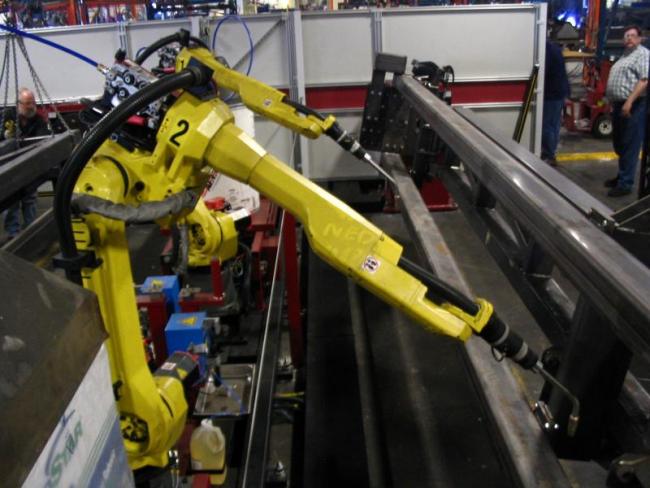Are Robots Making Work Obsolete?

By: Matthew Benzmiller
As Uber releases more about their plans for self-driving cars, the creeping concerns about automation replacing jobs have risen again. The common fear of the externalities of automation has been ongoing since basically the beginning of automation in the 18th century.
The initial response from those who fear job-replacing innovation is understandable. Economist Dr. Mateusz Machaj, points out:
...it is hard to predict what will happen in response to innovations that make certain job skills obsolete. And it’s not just the workers who fear the change. The ruling class, faced with an idle and unemployed population might also fear social upheaval.
As Dr. Yale Brozen, an expert in the area of automation and professor of economics at the University of Chicago, wrote:
In the face of this data, why do some cry that doomsday is coming? What is it about automation that causes alarm? Why is it that workers asked about their attitutde toward mechanization feel no threat, yet appear frightened when asked about their feelings toward automation?
The hallmarks of automation, to distinguish it from mechanization or automatic methods, are its sensing, feedback, and self-adjusting characteristics. Because it senses changing requirements and adjusts without human intervention, it presumably does away with the need for human attendants or human labor. This is very fearful indeed to those who depend upon jobs for their livelihood.
Dr. Brozen attributes four main factors that contribute to this fear:
1. “One is based upon the assumption that there is a fixed amount of goods that buyers want.”
Brozen means that there is an automatic assumption that the ratio of man-hours saved by machines will directly cut the proportional amount of work hours due to output remaining the same. This line of logic doesn’t take into account the obvious, being that output tends to increase massively rather than stay the same.
2. “The second source of fear springs from the idea that automation or cybernation is something more than the latest stage in the long evolution of technology.”
What Brozen means by this, is that some people think that automation is leading to a Matrix dystopia, rather than being just a technological advancement.
3. “The third source of fear is our greater awareness of the people displaced by automation than of the other unemployed, and a greater concern for these people.”
Dr. Brozen explained at the time when there were three million unemployed, several thousand people are laid off because their skills are not usable due to automation replacing previously used technology. “Presumably, because these thousands possess only obsolete skills, there are not job opportunities open to them.” This is inaccurate, as people adapt to emerging innovation all the time. Nobody is concrete in their skills their entire life.
4. “A fourth source of fear is the high incidence of joblessness among the unskilled.”
This is underlined by the thought that unskilled people are unemployed because automation lessens demand for unskilled people, and that increase in demand for labor due to automation is only for highly skilled workers.
So, is this fear of automation justified? Dr. Bryan Caplan points out that if we subscribed to this kind of philosophy, most everybody would still be a farmer. Everybody would be employed, but people would not be nearly as well off. Caplan rightly says that “if progress is hard to explain after it happens, it is nearly impossible to chart before it happens.” There is no way to know what jobs will be created after new technology makes a shift in the market. Farmers who were now put out of the job by more efficient tractor-equipped farmers, ended up getting jobs in the new industrial economy, but nobody was there to tell them that before it happened.
This is what always happens after advances in technology affect the market. If this were not the case, then all those farmers would have just never gotten a job after being displaced by automation. Brozen said:
Automation has resulted in the re-deployment of the work force – not in discarding obsolete men for whom there is no further use. I said earlier that this is an old story. The extent of the redeployment which has occurred may startle many readers.
Governments of capitalist societies tend to understand this. The real concern is what people will do to keep their inefficient jobs. Dr. Caplan cites European labor unions that make it hard to lay off workers and that it is similarly hard to lay off workers in the United States (and often for the same reasons). The unintended consequence of these sorts of regulations is that employers are less likely to hire an employee if they are afraid of not being able to fire an unproductive employee.
Dr. Machaj highlights the long run progress that technology brings:
Economic progress decreases employments in one place, allows for creation of new ones, even in the service sector. During the process of liquidating employment positions, huge economic development is capable of multiplying per capita production within one generation, positively affecting all social classes.
When considering the mass improvements in the quality of life due to automation and the unknown improvements in the future, a transitional period of changing employment type for displaced labor is not what should be the focus when examining the economic effect of progress.
What exists today might not tomorrow; it is only part of reality, and something government regulations can’t stop.





